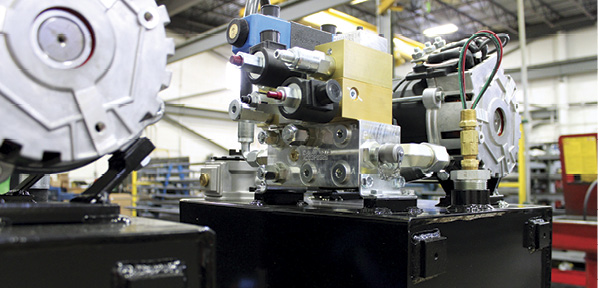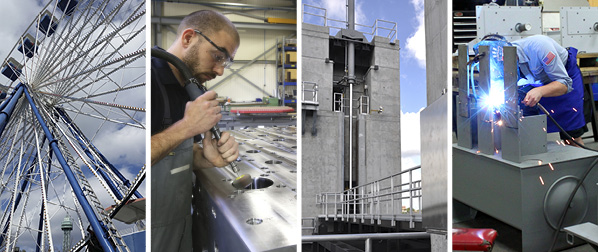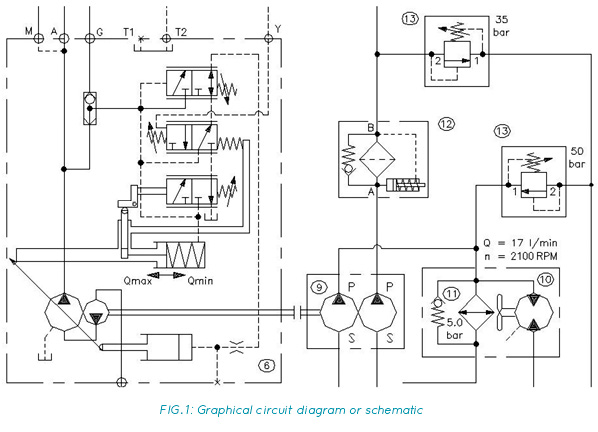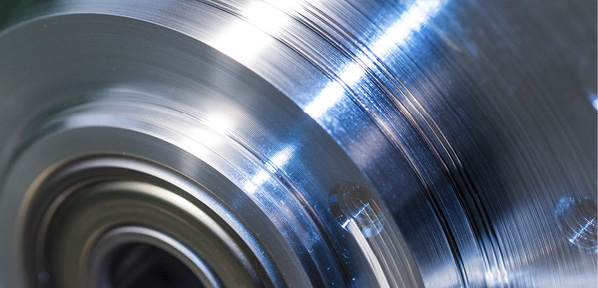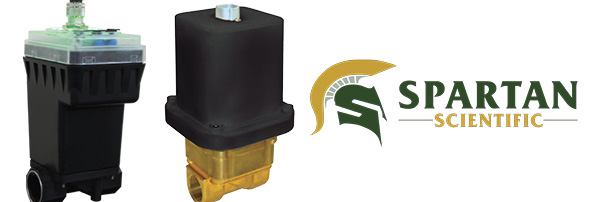High-Pressure Washdown Pneumatic Valves Improve Machine Performance
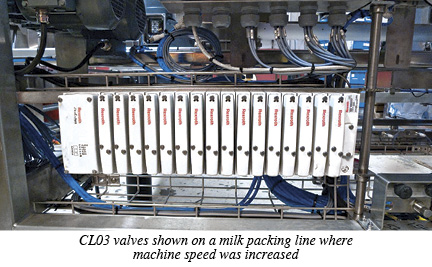
Manufacturers around the world rely on automation systems to rapidly produce quality products on a daily basis. These automation systems need reliable, long-lasting technology to deliver the productivity needed to sustain competitive advantages. Investing in the right automation technology and selecting the proper equipment to operate in demanding conditions are key engineering challenges, no matter what the industry.
In sensitive settings like the food industry, companies need to comply with stringent sanitary regulations, which often require machines to withstand countless cleaning cycles. Using pneumatics that have been engineered to operate in washdown and sanitary food applications can help machine designers and plant operators minimize downtime and keep maintenance costs low.
Clean and Lightweight: the Clean Line Concept
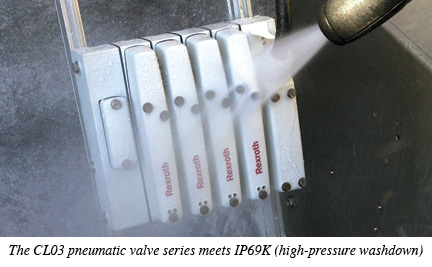
The CL03 Clean Line series valves from AVENTICS are high-pressure washdownapproved pneumatic directional control valves. Particularly useful in areas where direct contact with food is possible, the valves are also proven for areas where high-pressure, high-temperature cleaning of machines is required. The valves fulfill the requirements for IP69K protection class – the only pneumatic valves available that meet IP69K. The IP69K standard (better than NEMA 6P) specifies the ability to withstand pressures up to 1,450 psi (100 bar).
The special materials and construction of the CL03 were tested for use with chemicals and allow for easy cleaning. Materials include fiber-reinforced polyamide and stainless steel hardware. The hygienic design of the valve covers without seams or gaps, prevents dirt accumulation, and makes it easy to clean. The valves are available in custom-built manifolds, as well as single in-line valves.
Due to the high protection class rating, the valves are mounted directly in the system and do not require an expensive control cabinet; thus, shorter tube lengths for compressed air supply can be used and fewer power cables are required. This allows the valves to be located closer to the actuators, saving energy costs by reduced pressure loss from shorter air lines and improving machine efficiency by reducing cycle times. These advantages also enable faster, less time-intensive work commissioning and maintaining the equipment.
The standard CL03 pneumatic valves have a Cv of 0.7 to 0.85. An increase in the rating is possible by using the CL03-XL version, which has a Cv of 1.4 and greatly expands the applications covered by the valve line. The two sizes (standard and high flow) can be combined in the same manifold without transition pieces. The CL03-EV single valves offer a Cv up to 0.7.
Both the standard CL03 and CL03-XL valve manifold versions and the CL03-EV single valve version are available in all valve spool configuration types: 5-way/2-position single and double solenoid; 5-way/3-position closed center; and for more flexibility, in Dual 3-way/2-position valve types. The standard CL03 and CL03-XL manifold versions are available with either multi-pin or Fieldbus connectivity, while the CL03-EV single valve is available with a standard 4-pin M12 electrical connector. Completing the package is a full line of IP69K-rated mating connectors and cables.
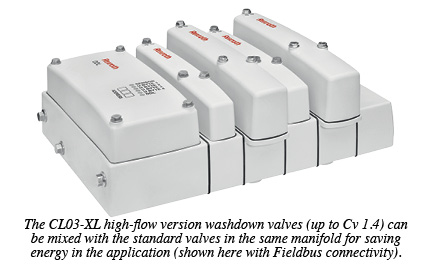
CL03 valve manifolds are modular and can incorporate up to 16 valves in one unit. The valve manifolds can be individually expanded, even after assembly, without having to disassemble the entire unit. The valve consists of individual base plates, each with its own internal cabling, and can be separately supplied with compressed air with the addition of pressure-isolating discs. As a result, up to 32 different pressures can be used in one system for ultimate customized applications.
To provide machine designers with more flexibility in the use of communication bus architectures, the valves offer integrated Fieldbus (for Profibus DP, DeviceNet, CANopen, and the AVENTICS DDL system electronics). They are designed with two separate power supply connections to support emergency-off solutions.
For serial communication options in industrial networking, the valves allow the use of AVENTICS DDL advanced diagnostic capabilities. With up to an additional 34 bytes of diagnostic bits at hand, customers can not only monitor their system to the coil level of each individual output, but also can monitor individual device voltages and communications. This reduces troubleshooting time and thus reduces machine downtime. The valve manifold systems are also available with multi-pin electrical connections and with remotely mounted bus modules with an IP69K protection class for major protocols other than those listed above.
Milking the Benefits of Pneumatics
Advanced Machine Company AS (AMC), a builder of milk-packing lines, uses two CL03 sixteen-valve station manifolds to speed up performance and reduce maintenance.
Harald Hals, CEO at AMC, said the Clean Line products were particularly appealing for AMC. “Although our machinery makes no direct contact with milk, it does have to comply with stringent requirements. That means withstanding countless cleaning cycles.” That is why consistent use of stainless steel and components meeting hygienic requirements is important. Even cleaning with a jet of steam at 100°C will not phase the equipment.
“A decentralized valve-operating system eliminates long feed lines with their typical pressure losses; neither do we have to install any expensive control cabinets,” is how Hals describes the advantages. “All that, of course, speeds assembly of the packing lines on site and makes maintenance faster, easier, and thus more economical.” AMC uses two such valve terminal systems for each packing line, populates them with sixteen valves each and connects their integrated bus with the DeviceNet protocol directly to the dairy plant’s bus system.
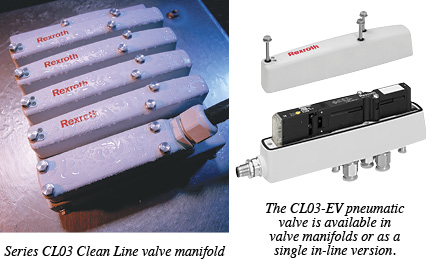
The solenoid valves in the valve terminal system are used to control the built-in GPC and ICL cylinders. The rugged PPC stainless steel guide unit is distinguished in particular by its precision and its resistance to transverse and torsional forces. Cleaning and maintaining the cylinders are made simple, too, thanks to a practical sensor attachment concept and the Clean Line design, aligned specifically with hygiene needs.
Conclusion
For washdown and sanitary food applications, the CL03 maximizes operational costs by ensuring corrosion resistance, secures food quality through optimized hygienic design, and improves production capacity by mounting the CL03 valves closer to the actuators. Using the correct pneumatic products in a properly designed washdown application is a very cost-effective and productivity-enhancing method of building modern food-processing equipment that will benefit the end-user of the equipment for the life of the machinery.


